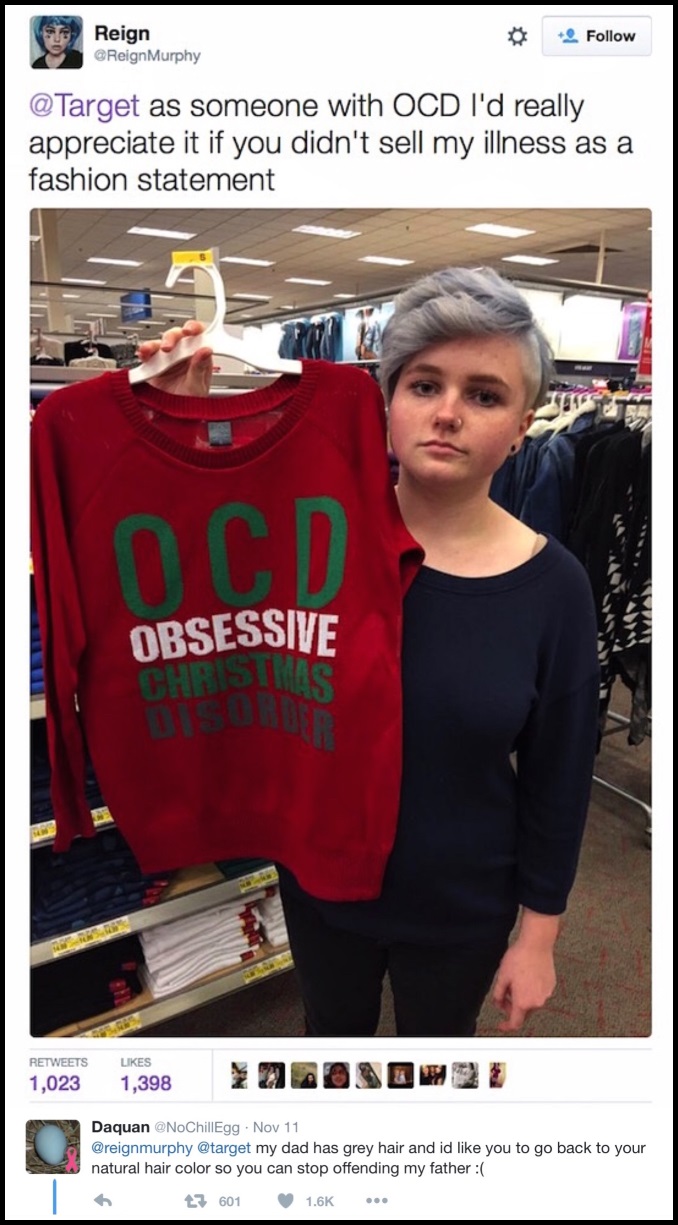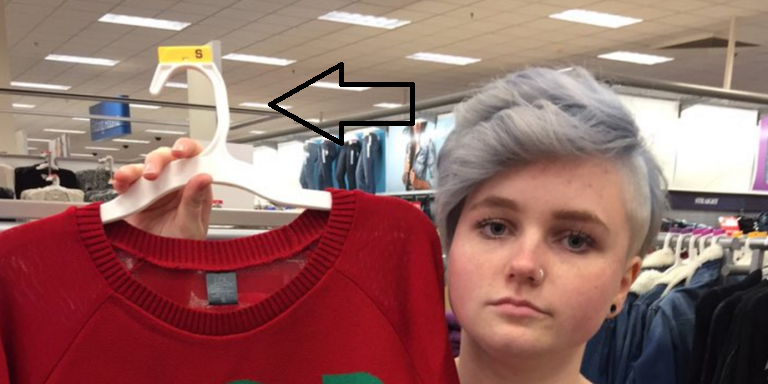A young woman was deeply offended by a sweater she saw being sold at Target. She immediately grabbed it from the shelf and snapped a photo, in utter disbelief that any retailer would sell such a thing. Should Target keep selling it anyway?
Reign Murphy was deeply disturbed while shopping at Target after an ugly red, green, and white sweater caught her eye. It wasn’t the color scheme that was an issue, however. The “insensitive” words emblazoned across the front were what was really ugly to Reign. She was so disgusted, she snapped a photo and put the large US retailer on blast.
Alongside a photo of herself holding the “offensive” top, which read, “OCD Obsessive Christmas Disorder,” Reign tweeted, “I’d really appreciate it if you didn’t sell my mental illness as a fashion statement,” admitting she suffers from real OCD. The tweet quickly went viral, receiving over a thousand retweets, as Target came under fire for the sweater with it’s $22.40 price tag for regular size and $24 for plus size.

The disparity in cost, of course, wasn’t the issue. Although “Obsessive Christmas Disorder” has become a phrase that many product designers have used on merchandise, describing those who love all things Christmas and perhaps go overboard, the play on obsessive-compulsive disorder had some sufferers of the mental illness fuming.
According to the National Institute of Mental Health, approximately 2.2 million American adults suffer from OCD, and a lot of them were seemingly ready to weigh in on the issue. Some customers, like Reign Murphy, felt the message on the shirt made light of mental illness and criticized the festive garment for trivializing it. Kate Gannon joined Reign, tweeting a photo of the sweater.
Soon, Twitter was filled with similar sentiments as several other social media users blasted the retail giant. “I am annoyed we still live in a world where picking fun at mental health is okay,” and, “Why is trivializing a mental disorder so widely accepted?” were just a couple of the many critical tweets.
But, others, including some who claimed to have OCD, felt the outrage was unnecessary and defended Target’s sale of the garment. “As someone with OCD, Target’s OCD sweater doesn’t offend me the least bit,” one Twitter user posted as another humorously added, “As someone who has OCD, I don’t see any reason to be angry about Target’s ‘offensive’ sweater – it’s perfectly even!”
Target ultimately responded to the backlash with an apology but seemed to tell customers to get over it at the same time. “We never want to disappoint any of our guests and apologize for any discomfort,” Target spokesman Jessica Carlson said in an email. However, the sweater wasn’t going anywhere anytime soon despite the outcry from those who felt the message belittled and mocked a serious mental disorder.
Although Target said the chain regretted that some customers were offended, they weren’t swayed by the intense criticism, saying there were no plans to remove the item until the season was over or it sold out. “We currently do not have plans to remove this sweater,” Carlson said, responding to the outrage.
This isn’t the first time — nor do we think it will be the last — Target was the center of controversy over their selection of attire. A women’s T-shirt with the word “Trophy” on the front received similar criticism and sparked a petition, demanding its removal from the store’s shelves. The shirt seemed to be a play on “trophy wife,” a term coined in a 1989 article about successful CEOs and their younger wives, but critics saw something very different.
“The truth is that millions of women and young girls are taken as ‘trophies’ every year in war, sex trafficking, slavery, and rape,” the petition said. “Labeling any person as a ‘Trophy’ is demeaning their humanity and objectifying them as a tangible object that can be bought, used, and disposed of.”
Target responded to that controversy by apologizing for offending customers. “It is never our intention to offend anyone,” the company’s statement said. “These shirts are intended as a fun wink and we have received an overwhelmingly positive response from our guests.”
Something upsetting can be found in just about anything if you’re looking for a reason to be offended, and this could be one of those instances. But, one good point was raised. A woman asked why it’s okay to joke about mental illness on a product but not a terminal illness, such as cancer since any adverse condition or diagnosis can be a detriment to someone’s life. Then again, comedy isn’t meant to be serious as it often makes light of solemn situations.
Humor can be a great coping mechanism when dealing with heavy issues, including disease and disorders. After all, isn’t laughter the best medicine? The question then becomes, which is worse: making a joke or engaging in emotional blackmail to manipulate others into getting what you want?
If “I’m offended” is an instant reason another must stop what they’re doing, we would be in a lot of trouble. If you don’t like the shirt, perhaps it’s wisest not to buy it. And, maybe it’s best not to give the “offensive” retailer and their “insensitive” merchandise free advertising by sharing your outrage on social media.





Hit the Target; take no prisoners.
I am trying to look for a present for my sister, and I’m confident this sweater would make her day time.
It’s stylish yet classic. Sweater dress